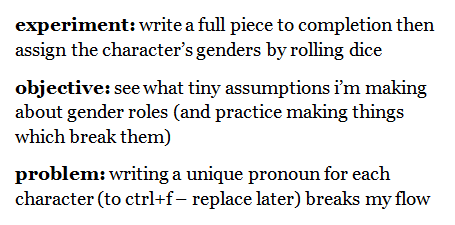It's always an interesting feeling when you've been completely paralyzed by the sight of the blank (or unfinished, or finished but requiring revision) Word document for days, weeks, or months, only to discover when a deadline looms that yes, if it comes down to it, you still can pound out 2500 words in a single Sunday. When 100 words have been giving every indication of being a Sisyphean task, you have to wonder where the switch got flipped.
I have a feeling it's in the "deadline" part.
When I was taking classes at the University of Iowa, one of my major complaints was that their fiction writing courses were non-graduated. There was no beginning, intermediate, advanced path to take – everyone, including the people just looking for three easy credits and with no passion for writing, got tossed into the same courses, and with the added complication that a lot of them thought "science fiction and fantasy" meant "you can't say anything about it because it's all just made up and doesn't have to make sense" meant that, with the exception of classes run by a couple
excellent people, I didn't often get a lot out of the critiquing parts of the workshops. But they were still invaluable to me.
Why?
Because sometimes, all you need is the magical combination of time to write, the expectation that you'll write, and a commitment to persons outside of yourself that you'll produce
something, even if it isn't a lofty piece of literature which will stand the test of ages.
Which is why Clarion West is such an amazing place, to be honest. Well, one of the reasons. I can't ignore the chance to learn from six amazing teachers with six different strengths and styles, or the amazing families you can form there, but what makes it a truly mind-altering experience is the fact that for six weeks, your entire life can be writing. You can saturate yourself with your fiction. Set aside work, cares, feeding the cats (or the kids), making yourself dinner, all the niggling cares of the so-called real world. All that's expected of you is fiction. The world is built around your fiction. And for your fiction, you are welcomed, supported, honored.
There's a reason so many of us join the Write-a-thon every year, hoping to grab back some vestige of what the workshop experience is like.
Anyway, now that I've tricked my brain into admitting that it
hasn't burnt out forever and ever and that it
can still string words together into a somewhat coherent narrative and that all the rest is just whining, I'm going to see where I get by the end of this week. This Friday, I have the first meeting of my new job; immediately thereafter, I'm going to be helping to launch a company. It'll be an exciting and busy time, and pretty much the opposite of the workshop in terms of the precedence my immediate world accords my writing.
But, you know, it's okay. As ever, we'll see how it goes.
...
There aren't any really good Write-a-thon-quotable passages from the 2500 words of yesterday, so I'll give you a snatch of one of the next projects I'm going to be working on: the post-apocalyptic pseudo-moleman-infested extremely unromantic love story
Rust City.
"Do people do that?"
"Look to sex for comfort?" Ferro asked. "It's a thing people do, yeah."
[
Semi-boilerplate text: As always, I hope you'll check out and support the
Clarion West Write-a-thon (and
me in particular, if you feel so inclined). Your donation will help a workshop that makes it all but impossible for authors
not to produce. And producing is half the battle.]


